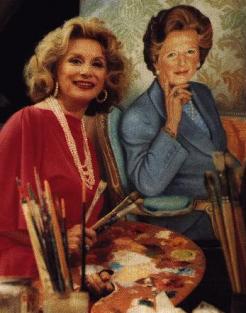Patricia Hill Burnett has led an extraordinary life. She was Miss Michigan in 1942 and first runner-up to Miss America that year. She also played the female lead for five years in The Lone Ranger and Green Hornet radio shows.

In 1969, Patricia demonstrated her commitment to the women’s movement by founding the first chapter of the National Organization for Women (NOW) in Michigan, and she went on to join the national board in 1971. She fought hard and long for her cause and remains an active member in many organizations. As if that wasn’t enough, she has distinguished herself as a world-renowned painter with portraits of Indira Gandhi, Margaret Thatcher, Rosa Parks and feminist Betty Friedan. Patricia makes clear that doing one’s best with an unpopular task can strengthen character.
“I attended a meeting of an organization that was beginning to acquire a very large staff and handle a lot of money. I was sitting in at a meeting, and they said, ‘We’re trying to research how our different local groups are reacting. Are they happy with their membership because we’ve heard a few grumbles and would anybody like to head up the task force?’
“I raised my hand. ‘Pick out your committee and do it,’ they said. So I picked eight people, sent out a questionnaire, and, to my astonishment, the answers came back from the different sections who were really getting upset with an organization that wasn’t paying any attention to them. They were feeling that the management was sort of elite and spoke only to themselves and kept re-electing themselves. The staff was very good at getting grants and so forth, so they had a great deal of power. Well, the staff heard about it and said, “We want to see this questionnaire, and we don’t want you to send anything else out until we check it first.” So, I sent them a copy and kept them clued in all along.
“The time was approaching to give the report to all the different sections and the members kept saying, ‘Patricia, it’s something that we want to say. Go ahead and give it.’ So, I went to the committee meeting and, lo and behold, instead of three members there were sixty!
“It’s very interesting to see the way that Parliamentary Law and lawyerly attempts can prevent a report from being given. There were frequent interruptions, and stalling until there was only fifteen minutes left on the agenda. I put my hand up and said, ‘I have to give this report. I want these last fifteen minutes.’ They were astonished because I’d always been a very mild-mannered, artistic-type.
“In spite of the staff and Board trying to interrupt me, I gave the report. One of the members, who was the smartest of all the lawyers there, came up to me afterward and said, ‘Patricia, you are so polite, so ladylike, but you cut them off at the knees,’ which I thought was the most treasured compliment I’d ever received!
“All of a sudden, to my astonishment, I’m their heroine. People from all over the country talked about my report and what should be done about it. I have a firm course of action and it’s under way.
“I was in the fortunate position that I had no secret agenda. I was just determined to give that report even though I realized that I’d lost maybe a quarter of them as friends and probably would never get them back. This has happened to me several times in my life. I felt that I had tackled an unpleasant, unpopular job. And I think, even in the smallest thing, if we can force ourselves to approach an unpleasant task and, by God,do it no matter how many people are trying to stop you, or how few people are watching, then it gives you a self-satisfaction that shows that you have character.”
Comments










